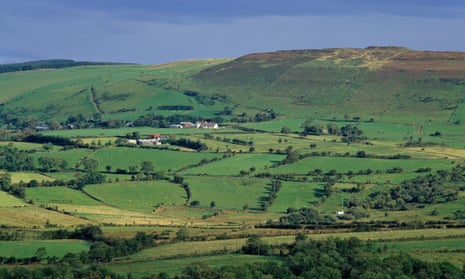Green energy subsidies are fuelling the rise of poultry mega-farms across Northern Ireland, with owners accused of contaminating sensitive habitats with emissions from chicken faeces.
An alliance of agri-food companies enlisted the support of Northern Ireland politicians to unlock an estimated £800m in subsidies for contractors. This has paved the way for industry expansion at the expense of the environment, according to an investigation by the not-for-profit journalism group SourceMaterial.
Moy Park, a food processing company that supplies chicken to some of Britain’s largest supermarkets, including Waitrose and Tesco, helped mastermind the plan to turn Northern Ireland into a poultry plantation, according to the investigation, which was published this week.
Documents show that Moy Park and other companies successfully lobbied Northern Ireland officials and ministers to adjust the region’s agri-business rules in their favour, despite the new policy producing a “nitrogen-soaked environment”, according to conservationist Catherine Bertrand.
The industry experienced huge growth after overcoming the problem of how to dispose of hundreds of thousands of tonnes of chicken litter, which was subject to environmental controls.
To solve the issue, industry officials obtained subsidies for biogas generators that turn animal waste into renewable energy. As a green energy, biogas lets the industry skirt limits on harmful emissions and dispose of the ammonia-laden manure. It was energy contractors, not Moy Park and the other agri-food companies, who pocketed the subsidies.
SourceMaterial’s investigation used official committee transcripts and Freedom of Information act requests to trace the relationship between the agri-food industry and the region’s devolved government, which consisted of a power-sharing pact between the Democratic Unionist (DUP) party and Sinn Féin at Stormont. The pact collapsed in January 2017.
Moy Park, which employs more than 6,000 people in Northern Ireland and processes about 6m chickens each week using a network of 800 poultry farms, appears to have been an influential voice.
Tony O’Neill, a company director, became chair of the Agri-Food Strategy Board, a government-sponsored industry committee tasked with creating a strategic action plan for farming in 2012.
The committee produced the Going for Growth plan, which envisaged intensive mega-farms, in line with the industry’s ambitious goals.
Arlene Foster, the DUP’s leader, was minister for enterprise, trade and investment from 2008 to 2015 and signed off on the plan. Sinn Féin’s deputy leader, Michelle O’Neill, was the agriculture minister from 2011 to 2016 and also had involvement in the plan.
Political connections helped the food processing companies resolve the biggest impediment to expansion: a EU directive on nitrates, the nitrogen compounds such as ammonia in fertilisers, which placed strict limits on how much animal waste can be spread on fields.
The industry’s proposed solution was anaerobic digestion, a process that turns plant and animal waste into biogas, a subsidised green energy source.
Between September 2014 and April 2017, Moy Park representatives held 14 meetings with agriculture ministry officials in which anaerobic digestion was discussed.
Northern Ireland’s mega-farms, including Moy Park’s contracted farmers, are due to benefit from about £830m of electricity billpayer funds for anaerobic digestion. This subsidy level level is four times higher than in any other part of the UK.
SourceMaterial calculated the 20-year estimate by combining the capacity of accredited anaerobic digestion plants with historical data on how that capacity translates into subsidies.
Stormont also approved a £12m loan scheme to build two large biogas digesters, including one specifically designed for Moy Park’s poultry waste.
Manure containing ammonia has been found across Northern Ireland. The region has less than 3% of the UK’s population but 12% of its ammonia emissions. Cattle farming accounts for most of Northern Ireland’s agricultural ammonia emissions, with the poultry industry accounting for about half of the rise in ammonia since 2010.
“We’re living in a nitrogen-soaked environment,” said Bertrand, who is head of conservation at Butterfly Conservation Northern Ireland. “There’s a diffuse pollution that comes through our air, comes through our groundwater, and everything is gradually being enriched.”
James Rainey, an ecologist, said ammonia was driving out species and changing the environment. As an example, he cited the vanishing of six species of lichens in Co Derry’s ancient woodland. Only one species remains.
In a statement Moy Park, which was sold for $1bn (£780,000) last year to Pilgrim’s Pride, a US-based food multinational firm, said it recognised the responsibilities of Northern Ireland’s agri-food industry to manage nitrogen-containing materials in food production.
The statement said: “We take our role in this very seriously, working collaboratively with our farming partners to ensure best environmental practice. The poultry industry is highly regulated and we operate to exacting welfare, bio-security and environmental standards.
“Our independent farming partners are carefully selected for their stockmanship, animal husbandry and business skills required to meet these standards. While anaerobic digestion forms part of our Litter Utilisation Strategy, we will continue to cooperate with government and others in the industry to identify appropriate new technology as it emerges.”
The SourceMaterial investigation also identified alleged scammers who abuse the system by claiming tens of millions of pounds in subsidies for biogas plants that do not appear to exist.
A spokesman for the energy regulator Ofgem said it could not comment on individual cases but took fraud allegations very seriously and audited all current and prospective scheme participants.
Stormont’s power-sharing deal collapsed over a separate green energy controversy – a renewable heat incentive (RHI) scheme, which degenerated into the cash-for-ash scam in which farmers heated empty sheds.
